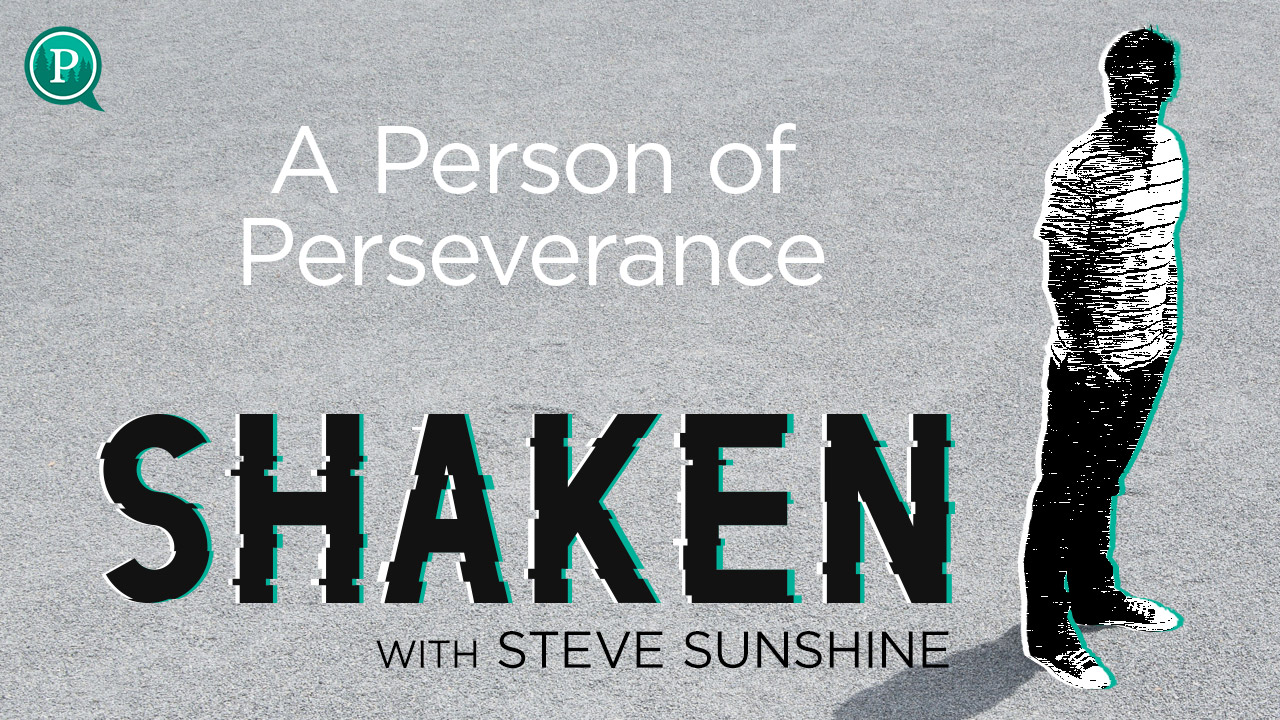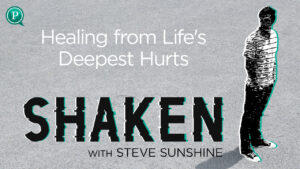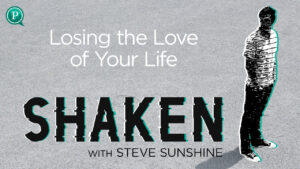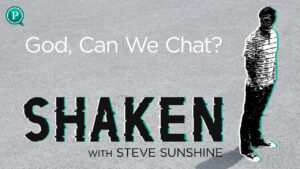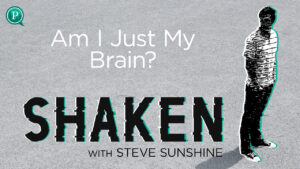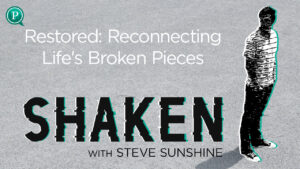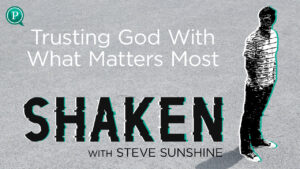Ann Kirsten’s journey to Jesus has been unique. Rather than an a-ha moment followed by problems vanishing, the trials in her life continued and were joined by new challenges. Through all of it, her love for Jesus has only gotten stronger. Ann is a blogger at allmomdoes.com.
Show Notes:
Find Ann at AllMomDoes
Video: Not Right Now by Jason Gray
Transcription:
Steve Sunshine:
We live in a time of unprecedented comfort. We value safety and security, and maybe that’s why it’s so easy for us to be shaken when the straight road we’re on takes a sudden curve and seems to be pointing us in a direction we don’t want to go. Welcome to the Shaken podcast. I’m Steve Sunshine. Your confidence, your mood, your perspective, even your faith may be shaken because of something that’s happened in your life. Jesus told us we’d have trouble in this world, so we’re shaken but not surprised. He also said, “Take heart. I have overcome the world.” In this podcast, you’ll hear honest conversations with people who have or are going through life altering hard times and have found that God was with them in the midst of it all.
God grows us through trials. He can take the faith you have, whether it’s a lot of faith or very little, and grow you into a person of patience, empathy, and perseverance. Ann Kirsten is with us and she’s with allmomdoes.com, which is a super website that if you haven’t checked out yet, I totally recommend it. And she’s a blogger with them. Ann, thank you for joining me. I know we’ve got a lot of different things we could talk about, but I just want to say upfront before we hear your story that you are courageous for being willing to share and I really admire that.
Ann Kirsten:
Well, thank you, Steve. It’s funny how the things that I’ve kept hidden for so many years, for really all my life, are now the things I talk about. I feel like that’s a huge step for me.
Steve Sunshine:
It’s a way of having mastery over them in a way.
Ann Kirsten:
Yeah. I looked at them a different way rather than being really shameful to just part of my story and that is a huge step for me. And I think I come from the same kind of background as you do, which is not a background of faith. And I know that you’ve mentioned that your wife was such a wonderful help as far as answering questions and things like that, but I was trying to do it by myself. I didn’t have anyone to turn to for guidance. It was a path I was taking alone. So I got a lot of things wrong. I thought, well, if God is love, then I can do anything I want, and he’s going to condone that because he loves me. But then when you think about kids who have never had discipline, it doesn’t ever turn out very well.
Steve Sunshine:
No.
Ann Kirsten:
So yeah, through the years there’s been a lot of things that I thought were true and right that really weren’t. So it was a long road to any kind of faith, I guess. I read the Bible, didn’t understand what in the world was going on. So I worked really hard to try to get to a place of faith. And especially when I was married and started having kids, I wanted them to grow up in a home with faith. So it made me push myself even farther. And to make matters worse, I had to deal with anxiety and depression. And that was a whole other battle. And so finally, probably around my early 40s, I felt like, okay, I got it all together. The teens are older. I’ve dealt with the depression and the anxiety. I have this whole faith thing figured out. And that was when I started noticing that my hearing seemed a little muffled.
And I was out to lunch with friends and we were all the same age, and I said, “I think I’m losing my hearing.” And they were like, “No, no, no. We all feel that way. You’re fine.” And then a couple of weeks later, my husband and I were headed out to dinner and all of a sudden, just like a thunder clap, I was hit with this horrible feeling like there was no equilibrium left in me and in the world. Everything was spinning. My eyes were darting back and forth trying to find something to focus on. And all I could do was … I just slumped to the car door and just moaned. I didn’t know what was going on. So Jerry drove back home and by the time we got there, I couldn’t walk. Everything was just twirling so fast. So he had to practically carry me into the house, into the bathroom where of course, I just was really, really ill. And the very next day I got diagnosed with Meniere’s disease, which no one really has heard and I certainly hadn’t.
Steve Sunshine:
You have to explain it every time you tell people.
Ann Kirsten:
Exactly. And then they think they know … A lot of people will even say, “Oh yeah, yeah, I have vertigo too.” And I’m like, “No, you don’t.” Because I thought I knew what vertigo was. I thought, okay, it’s that feeling where you’re lightheaded, you get up too fast or you have a little woo. No, it’s so violent. The only way I can describe it is being drunk on a tiny boat in the middle of the ocean during a hurricane. It’s just everything is spinning. There’s no rhyme or reason. It’s a nightmare. So what Meniere’s disease is is in your inner ear, you have two sacs and there’s a thin membrane in between those two. Each one has a chemical, and those two are not supposed to mix. So if that little splits, they do mix, and then it’s like this bomb goes off inside your head. The thing about me is I have always had this phobia about being ill, throwing up, being dizzy, being out of control. So I never drank. I didn’t want to have that feeling. I never did drugs because I didn’t want to feel out of control. And so what do I get? I get this lovely disease that causes all of that to happen to a huge degree and without warning. You just can be making dinner and then all of a sudden it hits and you’re on the floor.
Steve Sunshine:
How often does that happen?
Ann Kirsten:
At first it was pretty rare. So I was like, okay, I think I can live with this. But then it started happening more and more often to where it was maybe once a week, once every two weeks. It became really scary to even leave the house because who knows when it’s going to happen. I’ve had to, like a vet in Vietnam, I’ve had to crawl on my belly trying to get to the bathroom because it hit when I was in another room. Just really nightmarish. And the fact that it was exactly those things that I hate the most really struck me. So at first I felt betrayed. I’d worked so hard to find this faith, and then this happens. I would crawl. I would be laying in the bathroom and I would say, “God, do you remember that there’s serial killers in the world? Could you maybe give them Meniere’s so that they’re stuck in bed and they can’t go kill?”
Steve Sunshine:
I take it that didn’t happen
Ann Kirsten:
It didn’t. There was a lot of why me? Why, why, why? And there was radio silence at first and then I really felt that it was like a punishment somehow. So I dealt with that. I think I went from being really angry to just sadness. And I would lay in bed and look at the pile of Kleenex, just grow on my bedside table, just crying. Bargaining came into it. What do you want me to learn? Just tell me. Just tell me what I’m supposed to learn from this. I promise I’ll do it. Or do you want me to give up chocolate? I’ll give up chocolate. I’m assuming you had the same path when you were diagnosed, or maybe you were further along on your faith journey, so you didn’t have those.
Steve Sunshine:
Well, it’s not to say I didn’t have issues. I was further along on the faith journey so that I think helped. I also wasn’t facing extreme symptoms. For anybody who hasn’t heard any of the other episodes, I have Parkinson’s disease, and I was diagnosed about five years ago. I remember cracking jokes with the neurologist beforehand. He didn’t think they were funny because he knew what he was looking at. And then I had that talk that nobody wants where the doctor sits you down and gives you bad news. For me, I guess my first reaction was, this doesn’t feel real. I was a little numb. And then my second reaction was driving home from the doctor’s office, going in thinking … Because I just had an MRI, which was clear. I thought it was going to be relatively good news. And from that standpoint it was. But my biggest concern was how do I tell my wife? What am I going to say to her?
In fact, I didn’t even take her call on the way back because I thought, this has to be in person. I don’t want to say I’ve got something to tell you and make her wait. So those were the first things. And then when I started having … This may have been the result of a clinical trial medication or the disease, but I started having some cognitive things that were really weird that made it hard for me to work. And that was probably the point where I felt closest to where is God in all of this? So that’d be it for me. It was a little different, but the same. It’d be hard to imagine somebody not at some point saying, why is this happening when something like this happens. Even somebody who’s got a very strong faith.
Ann Kirsten:
It took me a long time to feel loved by God and that I was a child of his. You feel like you have this bumper around you then. And then when this stuff happens, it’s like, well, where am I then?
Steve Sunshine:
So when did you start to see him in all of this? What did that look like?
Ann Kirsten:
I think finally I thought, okay, well … Because first I tried to fix it. And so there’s stair steps of all of these weird things you can try and I tried them all. And every time I was focused on, I want this gone. I don’t want any part of this. And so once all of those things failed, I thought, well then what do I have? And all along, I knew God was, and God was real. I never doubted him being God. So I thought, okay, well what can I do? What am I left with? And it hit me that I can still … Even if I’m laying … I have to lay with my bad ear up and I’d have to push my forehead to try to find some place of placement in the world while everything’s spinning and sometimes for 48 hours at a time. And I thought, you know what? I can still pray.
And the prayers changed from for myself and healing to other people. I can still pray for my family, for my friends. And so I began doing that. If I had a good enough day that I could text someone, I would ask them what their needs were. If I had a pretty good day and could write, I would write a card and have my husband mail it to someone. And that changed everything. It didn’t heal me, but it changed how I looked at it.
And for me, healing up to that point meant complete healing. I want it gone. I don’t want this. And it became a whole different kind of healing. It took me a while, but really beautiful in its own way. You can’t have empathy without walking that path yourself. So you are going to have way more empathy for people with Parkinson’s than you would have if you’ve never dealt with it. And for me, people that were chronically ill, I always thought, well, you’re weak or you’re this. And then to get it myself, that empathy just grew by leaps and bounds. So that was the very beginning of just looking at healing in a whole new light. After that, I started writing with AllMomDoes, which is such a gift and a passion of mine. And I had this whole thing where I would write … for every holiday, I’d send cards to people that lived alone. There was so much I could still do in spite of all of this stuff. So it became a different kind of world, but really some beautiful things came out of it.
And then about 10 years in my left leg started aching, and I developed a clot from my knee all the way up into my abdomen. And when they tried to break that up, they broke the main artery. And so I just started bleeding out. They kept dumping blood in. I think I heard later 18 units, and it would just pour right back out again. Finally, they put a stent in there. I flatlined. They brought me back. They put me in a coma and when I woke up, I could do nothing on my own. I had a ventilator, I had a feeding tube, I had a catheter. I was just frozen in this body. So here I had worked so hard to get a handle on this whole Meniere’s thing and then this happened.
Steve Sunshine:
Is it related to Meniere’s or is this totally separate?
Ann Kirsten:
No. It was some other weird genetic thing that I didn’t know I had. A weird crossing of blood vessels. So yeah, I had to learn how to swallow, how to walk, how to move my arms again, how to speak. I had an ABC chart that I’d point to and really fought hard again to be okay, to get back home. And about two weeks after I got home and was starting to feel a little bit like myself, Meniere’s hit again. An attack. And I remember I was just devastated. And I was like, are you serious? Because I’d had a remission while I was in a coma. And I was like no, this just can’t be right. And so at that point, again, I reverted back to feeling forgotten. And I did go for some more radical treatment.
They removed the bones in my inner ear so that hopefully those sacs could have as much fluid as they wanted without splitting that membrane. That worked for about a year and a half. And then finally I had to have chemical shot in that ear, which hurt like the dickens. But it keels off all the balance on that side. So the good news is your brain is not getting the spinny feelings, but the bad news is you’re not getting any balance feedback at all. So then I had to relearn how to move through the world again.
Steve Sunshine:
Again.
Ann Kirsten:
I use my eyes a lot. Every move I make, I have to think about it. When I go down the stairs, I shut one eye to make sure not double visioning. And again, I had to start over and go, okay, well …
There was one day I was laying in bed and it was like God said, “Well, what do you know?” And I thought, “I know you are. And sometimes that’s all I know.” It was the perfect time for him to reach me because I was beaten down. I was in bed. Just nothing I could do. So finally at that point, I could hear him and hear him working with me. And again, the healing didn’t look the way I thought it would look, but it was still a new different path of me learning how to move through the world. And in a way, it was a gift because most people take their balance for granted. And so to have to look at even something as simple as balancing in a new way was a whole new journey. And in a way, then I started feeling blessed that he thought I was worthy of some kind of refinement. Some kind of new learning. That was a gift in itself.
Steve Sunshine:
That’s the kind of thing that I think marks a Jesus follower is that you can even begin to think of it that way. That occurred to me too, that this is … In a way, it’s an honor. I’m not sitting there saying that it’s an honor I would’ve chosen. Please give me an incurable disease that is progressive. Wouldn’t have done that. I don’t know. The apostles were so amazing in the early church in the ways that they were able to rejoice in real suffering. Some of the stuff that they went through was legitimately horrible and it puts a goal in front of us. Something to aspire to. I don’t know too many people who have achieved that fully. Maybe nobody. I think it’s something that God really honors.
Ann Kirsten:
Well, I was just going to say there was some very kind people that would say, “Oh my gosh, you’re living Job’s life.” And I’d always rear back and go, no, no, no, no. Because he lost his kids. He lost all of his money, all of that stuff. It hadn’t gone that far. I appreciated the fact that they would think that way, but I couldn’t myself think that way. I couldn’t go there.
Steve Sunshine:
Poor Job. He was used as it seems like as an example. The reason at least it’s recorded is for us to see what this all looks like when somebody is suffering and ask the questions. And God’s answers are not all that satisfying. And from a human standpoint, where were you when I created all of this? The answer is, you’re not God. We’ve said that on several episodes on this show. We actually have one all about Job if you want to check it out. That is not meant to be cold sounding. You’re not God buck up. It doesn’t mean that. It just means we can’t expect to understand everything. And that’s a hard truth to deal with. We had Laura’s story, the singer on, and she talked about … Her situation is that her husband has some brain injury that has caused him a lot of trouble over the years. Anyway, she talks about God is our sustainer. When we’re in a storm that he decides to leave in place he’s our sustainer. Have you felt that?
Ann Kirsten:
Yeah. In fact, someone recommended her album to me and my husband bought it for me because there were a lot of parts of her story that I knew I could learn from. I think when I was finally quiet enough to hear that … And really all along God was my sustainer. I couldn’t have done it otherwise. I couldn’t have made it through. There are a lot of Meniere’s patients that commit suicide because it’s just too nasty to deal with. In fact, they believe that Van Gogh had Meniere’s disease from the letters that he wrote to his brother and the symptoms that he was feeling. And when you look at his paintings, you can see the swirls.
Steve Sunshine:
That’s so interesting.
Ann Kirsten:
And that’s the life. Yeah. That’s the life we live. So without him, I don’t know how far I would’ve or how I could find joy in the new version of life that I was given. I couldn’t. I just couldn’t. I always still question myself because I didn’t grow up in a family of faith. It’s like, am I doing this right? Am I thinking in the right terms? Am I on the right path? And as years have gone by, I’ve realized there is no path. Everyone has a path, or I should say it that way. And it’s going to look a little different for every person. Their path’s going to be a little bit different, and that mine is fine. There are pitfalls. I fall off every once in a while, but for the most part, I’m still aimed in that same direction and that’s okay. I don’t know all the lingo. Sometimes church seems like a closed group. A club. And so to fit in and really feel like I’m a child of God, that did take a while.
And I, again, question it when all this happened, but the path brought me even closer to him and brought me so many beautiful things at the same time. I remember reading a Christian … It was a novel actually. It was in the old days. The mom was paralyzed. And she was in bed bedridden. And the family would gather around her. They’d bring their food in and have dinner with her. And it was such a joyful … She was so full of joy. And I remember during all this thinking, that’s a choice that I need to make. And so I started … It was laying in bed on my one side, and my husband would come in, I started smiling when he came in. And it meant the world to him because I’m sure your wife can attest to the fact that it’s so painful to watch your loved one go through these things.
And we’re a tall family so all of my kids are six … The girls are six feet, the boys are six-five. The son-in-laws are huge. And so I have pictures of them. If I’m having a bedridden day and there’s a family party, they all end up in my bed. And there’s these big long bodies stretched out everywhere.
Steve Sunshine:
That’s awesome.
Ann Kirsten:
All over the bed. The grandkids are there. And I remember looking at this and thinking, this is really pretty beautiful. This is cool. I would rather be up with them partying, and sometimes they would be off in the other room, but I could hear their laughter. I could smell the food they were making. It just brought me so much happiness and joy to almost be on a different plane watching the beauty of family. And so there was a lot of really cool things that came out of this that I wouldn’t have had otherwise or I would’ve taken for granted or wouldn’t even have thought to look for.
So my daughter, my oldest daughter … If it was a really bad day … Sometimes I’d have to spend 18 hours on the bathroom floor and she would make a nest in the bathroom. She’d put down quilts and pillows and make this beautiful little nest in there for me. And just that in the midst of feeling ill and crying, I could see that beautiful little nest and go, wow, I am really blessed. This is a beautiful thing. And God has given me this beautiful family and all of this love. And it helped. It helped a lot. I probably wouldn’t have appreciated it to that same degree if I was running around living my life and bopping from one thing to another. So there were some really cool things. I don’t know if you have heard the song Not Right Now by Jason Gray.
Steve Sunshine:
No. I don’t think so.
Ann Kirsten:
This song is amazing. Someone shared it with me while I was going through all of this. The acoustic version on YouTube. I always look up Not Right Now. And basically it’s like he wrote it when his world was falling apart. Basically how people are like, “You know what? It’s going to be fine. It’s going to be fine. Everything’s going to be great.” And basically he’s saying, “Yeah, I know. I know it’s going to be all right, but not right now.” And that’s my story. It’s like, okay, we have to go through this stuff before we can see that beautiful part of the path. Yes, sure, it’s going to be all right, but just not right now.
Steve Sunshine:
Even if you’re a believer in Jesus, it’s okay to be in pain. It’s okay to admit that you’re in pain. Trusting God does not mean that there’s no pain. Not until that wonderful verse in Revelation where he wipes every tear from our eyes and we live with him and he’s our God, and there’s no more pain or death or sorrow. That’s not here yet. So it’s okay to admit that and to say that. Interesting thing … Another trial I had in life years ago, before I was a Christian, I was engaged to a girl, and the engagement broke off a week before the wedding.
Ann Kirsten:
That’s heartbreaking.
Steve Sunshine:
It was. Although I know now that it wasn’t right. It shouldn’t have happened, and I’m glad it didn’t. But at that time, it was very painful. And I didn’t have Jesus in my life. My grandmother came into town because she was coming into the town for the wedding anyway. She did not cancel her trip. And she said, “I have a rule I’d like to follow, and that’s that If something’s not going to bother me 10 years from now, I try not to let it bother me now.” And that little piece of wisdom was really helpful. It’s a little different from a chronic illness that may very well be with you for the rest of your life. I get that. But in terms of one of a trauma that comes on, and it’s a one-time deal like that was, it was a really good piece of perspective. And I think it helped me.
And even if you’re dealing with something like a disease that you have, for example, it seems like it won’t go away or something like Parkinson’s. Something that’s going to be ongoing. It’s not that the thing won’t bother you in 10 years or whatever amount of time, but given that time abiding in Christ, you’re going to get to the place where you’re at a place of relative comfort where you feel his presence and you know that he hasn’t abandoned you and he loves you through it, and he’s walking through it with you. And I would imagine in some way, he’s feeling the pain along with you too. And then we have that promise in Revelation that one day all this will be over. If nothing else. And we have the possibility of an earthly miracle, it goes away. That’s awesome. When those stories happen, we celebrate them. But the promise is that he’ll be with you through it, and that if nothing else at the end of our lives here and in the next life, we won’t have to worry about any of this stuff.
Ann Kirsten:
Yeah. In fact, my husband will say, “Is it time yet? Can I go now?” He know as you get older and all these things are happening to your body, you’re like, okay, I’m ready.
Steve Sunshine:
One more little frustration or whatever.
Ann Kirsten:
Yeah. Exactly. And it is interesting that now I’ve also been hit with diabetes and some vision issues. I know. And so since I get my balance a lot from my eyes, and now my vision’s wonky, but this time I jumped from … I skipped that whole anger bargaining steps that I had spent too much time in before and this time went straight for, okay, well now what can I learn from this part and what can I still do? And how can I find joy and be thankful? And so it’s nice to skip the nasty part of the path and go straight to, okay, let’s do this. Let’s just see what kind of world.
Steve Sunshine:
I don’t know what to say about that except that you’re experienced in this, which is not … Talk about a mixed blessing.
Ann Kirsten:
I’m a veteran now.
Steve Sunshine:
You’re a veteran. And it definitely helps in dealing with the new thing. But man, I’m sorry that that’s the way that you’ve gotten that experience.
Ann Kirsten:
Yeah. And still, I feel … Now my prayer, my ongoing prayer, I think we all have it, is I want to be a wise old woman that is of use to God. That is my whole thing. And so I’m gaining wisdom by all these little weird things that happen. Now I can have empathy with people whose eyesight is wonky, the diabetics, the whole thing. And I feel so blessed that he thinks I’m worthy of learning and refining. And that’s the mindset that I want to keep. Seeing that beauty in God’s teachings.
Steve Sunshine:
And he does. And you can see it in your work. So you mentioned wisdom. Maybe we can end with some wisdom. If somebody were to come to you with a problem of any sort … Because it doesn’t have to be medical, relational, economic, financial, whatever. Something horrible is going on in their lives that they have to deal with. What do you say to someone like that when they come to you and say, how should I be looking at this?
Ann Kirsten:
I think my first step is hearing them. We don’t listen anymore. And so I had three dear friends who were battling breast cancer, and I took them out to lunch and I let each of them tell their story. And they were in tears because no one cared. No one wanted to hear their path. And so that’s always my step number one, is to let them share their story and to really hear and be in that moment, not waiting for my turn to speak and then praying for them. I had a friend come over when I was … I was just done. I was just at a really low point with this disease, and she came over and prayed for me. And not growing up in that kind of background, people had not done that for me. I just sobbed. It was such a beautiful, beautiful thing for her to do.
And so I always try to pray with the person. Having heard their story and what their unique needs are, “You know what? This is also going to end up beautiful. Whatever this thing is that you’re going through. If you stop long enough and listen and find God where you are, and in those dark places, this I promise you’ll look back on it and say, you know what? It was fine. I’m fine. And it was actually a beautiful learning experience.” So that’s my modus. What’s yours? I want to know yours.
Steve Sunshine:
Boy, I think listening is crucial, and I think it’s the thing that we’re most likely to forget so I’m glad that you said that. I really would try to emphasize and maybe even say directly to anybody who’s listening to this right now, that this does not mean that you’ve done something wrong. It certainly doesn’t mean God doesn’t love you. He does. I saw somebody speaking somewhere who said that nothing is pruned unless it’s alive, and pruning is painful. And I don’t know why you were chosen to have this problem happen. And I don’t know whether God’s going to fix it soon or not. I recoil at people who make promises about stuff like that. But he could, and he’s capable and he might so pray for it. But also pray for his presence and his comfort and that sort of thing. And he will deliver that. He’s already with you. He hasn’t forgotten you. And one day all of this goes away. But if you abide in him, he’ll give you strength. Something like that.
Ann Kirsten:
I like that.
Steve Sunshine:
That’s the way I’ve dealt with my situation. The story of Paul and his thorn and my grace is sufficient for you, speaks loudly in my head and in my heart. My strength is made perfect in and your weakness. So we get the chance to make God’s strength perfect by being weak.
Ann Kirsten:
Yeah. Firsthand.
Steve Sunshine:
None of that means it’s not hard, but that is significant and that’s real. Go back to scripture. That’s the other thing.
Ann Kirsten:
Yes.
Steve Sunshine:
But the listening part is huge too, because it’s so important to let people have permission to be hurting and to just say, this hurts and to grieve that.
Ann Kirsten:
Yeah. And not offer those platitudes or the easy answers. And I think that’s why it hit me with that song, Not Right Now. It’s like, okay, not ready for that yet, but it’s coming.
Steve Sunshine:
Well, I’m going to look that song up. Jason Gray, Not Right Now. And we’ll put a link to it in the show notes.
Ann Kirsten:
Oh, great.
Steve Sunshine:
How can people connect with you, Ann?
Ann Kirsten:
Well, allmomdoes.com and I write once a week. Yeah. That has been a huge blessing in my life. Writing is a passion of mine, and I’m real.
Steve Sunshine:
You certainly are.
Ann Kirsten:
Warts and all are out there. And my life is not perfect. I hate housekeeping and my house is always a mess. I tell it like it is. I’ve been there since its inception and worked with the most amazing ladies and we’re all completely different. We’re at different phases of life. I love Stephanie. She and I have the same sense of humor, but she loves neatness, and I am a clutter person, so we all come from a different angle. But allmomdoes.com is a place we started to support women that at the time … It was before COVID but women who are maybe stuck at home and need a family, need a support group, and that’s what we are. And then COVID hit and it became even more important, and we love doing it.
Steve Sunshine:
Awesome.
Ann Kirsten:
It’s really a passion.
Steve Sunshine:
Allmomdoes.com. We’ll put that in the show notes too. And you can find Ann Kirsten there and several other bloggers that will encourage you in different ways. I know there’s fun stuff in there too. And Ann, I really appreciate you taking the time to talk with me today.
Ann Kirsten:
Well, thank you, Steve. It’s so nice to talk with you.
Steve Sunshine:
Thank you for joining us. We’d like to see as many people encouraged as possible, and you can help by liking, sharing, and subscribing to this podcast and by just telling your friends. Find new episodes at purposely.com or wherever you get your podcasts. Oh, and one more thing. If you enjoy Shaken, if you’re encouraged by it, if you think someone else would be, give us a good review.
Follow this podcast:

